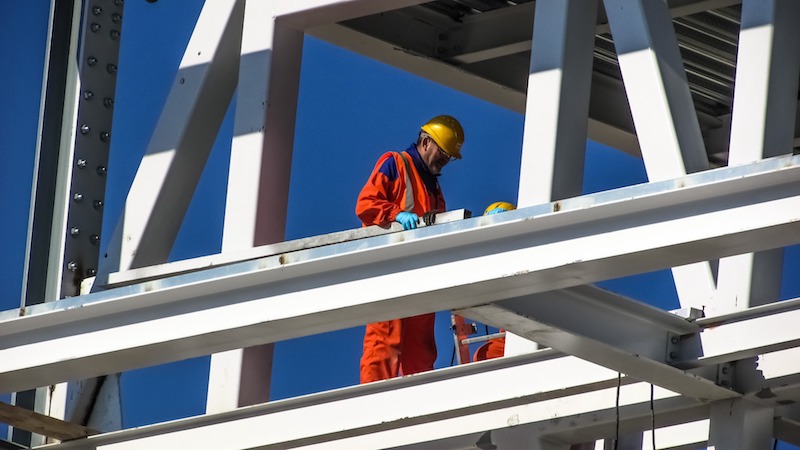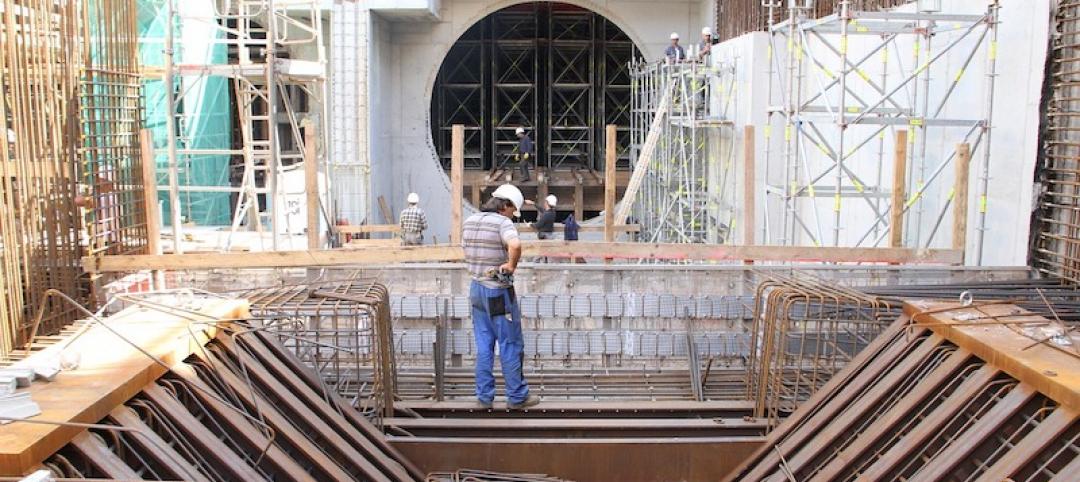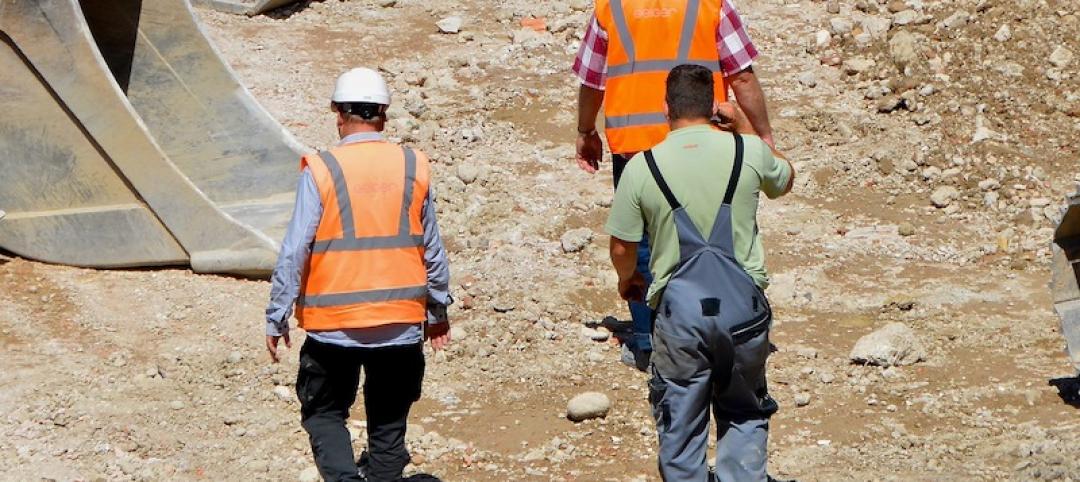The resolution of global construction disputes remained steady in 2016, and the average time it took to resolve those disputes declined bit, according to the seventh annual Arcadis Global Construction Disputes Report 2017, which is subtitled “Avoiding the Same Pitfalls.”
This report reflects the construction disputes that Arcadis’ team handled around the world. The report infers that the roadblocks to expeditious and less cost dispute resolution often stem from the need for better contract administration, robust documentation, and a proactive approach to risk management.
“Our industry contains the best problem solvers in the world,” the report states. “But there often seems to be a lack of ability or willingness of the project participants to compromise and resolve disputes at the earliest and most inexpensive stage possible.” Roy Cooper, Senior Vice President of Arcadis Contract Solutions, attributes disputes to “human emotions that can impede settlements, as they do with physical factors such as differing site conditions and design errors.”
The world’s economic expansion generally is not seen as an impediment to resolving contract disputes. Global growth is projected at 3.5% in 2017, and 3.6% in 2018, according to the International Monetary Fund.
While the outlook is positive, the report sees risks in labor contraction, increasing commodities prices, and uncertain immigration policies. “A potential widening of global imbalances, coupled with sharp currency exchange rate movements, should those occur in response to major policy shifts, could further intensify protectionist pressures.”
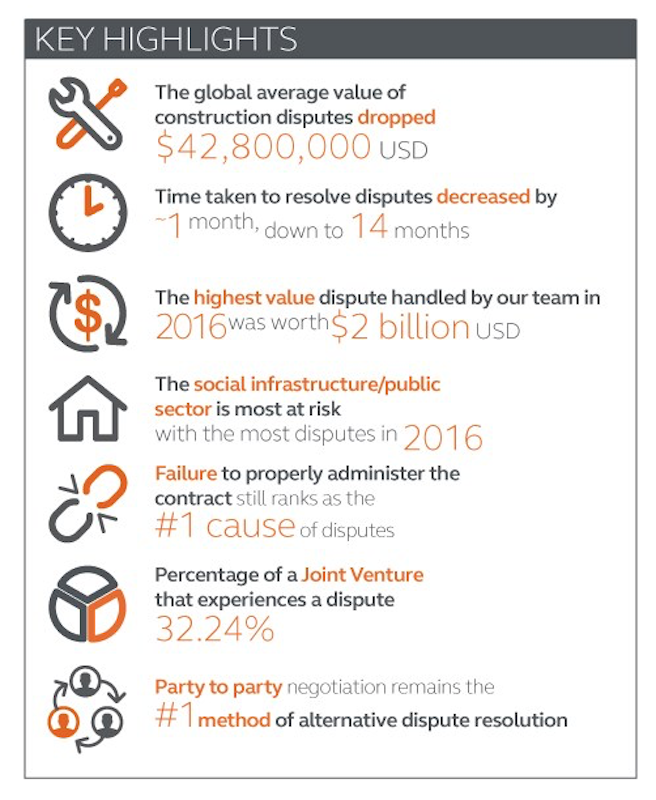
A summary of Arcadis' findings for 2016. Image: Arcadis US
That being said, the global average construction dispute value declined in 2016 by nearly 7% to US$42.8 million (and that includes one US$2 billion dispute Arcadis handled). Asia averaged the highest dispute value, at US$84 million, and the United Kingdom saw a double-digit increase in its average dispute value, to US$34 million.
The global average length of a dispute also fell slightly last year, to 14 months. North America’s dispute duration was the longest of all Arcadis’ regions, an average of 15.6 months. For the third consecutive year, the most common cause for disputes in North America in 2016 was errors and/or omissions in the contract documentation.
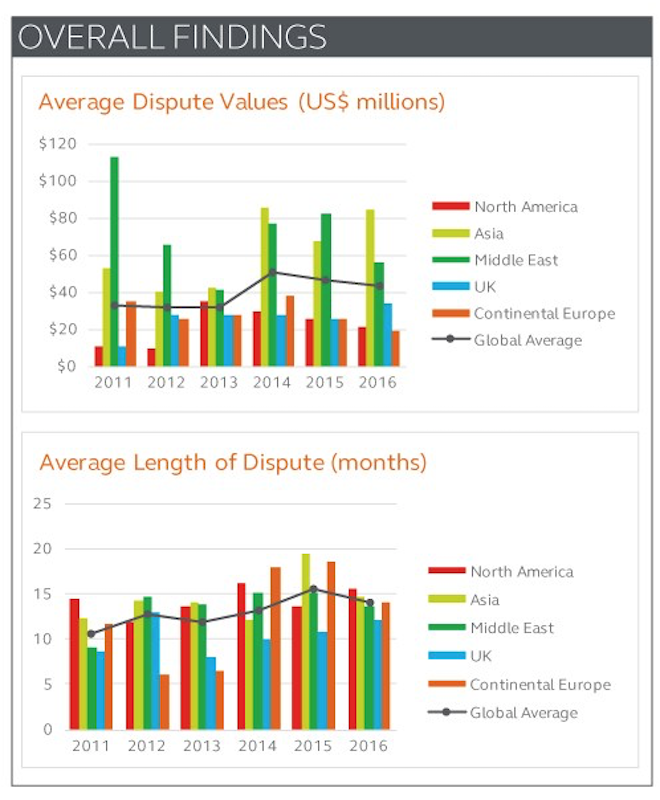
Asia had the highest average dispute value last year; North America the longest time it took to resolve a dispute. Image: Arcadis
Globally, Arcadis identifies failure to properly administer a contract among the five most common causes of disputes, along with poorly drafted or incomplete/unsubstantiated claims; the failure of an employer, contractor or subcontractor to understand or comply with its contractual obligations; errors and omissions in the contract; and incomplete design information or employer requires.
The most common methods to resolve construction disputes were, in order of preference, party-to-party negotiation, arbitration, and mediation.
And the most important activities to avoid disputes were led by proper contract administration, accurate documents, and fair and appropriate risk and balances in contracts.
Related Stories
Market Data | Jun 22, 2020
7 must reads for the AEC industry today: June 22, 2020
Construction employment rises from April to May in 45 states and the first building in the U.S. designed for post COVID-19 environment.
Market Data | Jun 22, 2020
Construction employment rises from April to May in 45 states, slips in 5
Rebound from April job losses reflects one-shot help from paycheck protection program loans and easing of stay-at-home orders, but cancellations and state and local deficits imply further cuts ahead.
Market Data | Jun 19, 2020
7 must reads for the AEC industry today: June 19, 2020
Brown University's first housing building in three decades and demand for family rentals expected to jump.
Market Data | Jun 18, 2020
New data shows construction activity returning to pre-coronavirus levels in many parts of the country
Association survey and data collected by Procore measure impacts of the pandemic, showing signs of a construction recovery, but labor shortages and project cancellations show industry needs federal help.
Market Data | Jun 18, 2020
AIA releases strategies and illustrations for reducing risk of COVID-19 in schools
For the 2020-21 school year, districts are facing the difficult task of determining if K-12 schools will reopen this fall.
Market Data | Jun 18, 2020
6 must reads for the AEC industry today: June 18, 2020
Northbrook's new cannabis dispensary and America's structural steel industry remains a success story.
Market Data | Jun 17, 2020
6 must reads for the AEC industry today: June 17, 2020
Santa Fe becomes the second city in the world to achieve LEED v4.1 and the megacity is dead.
Market Data | Jun 16, 2020
7 must reads for the AEC industry today: June 16, 2020
Tottenham Hotspur Stadium has its own brewery and workers want policy changes before they return to offices.
Market Data | Jun 15, 2020
International Code Council offers guidance on building re-occupancy for reopening economies
Companies and building managers can access free resources at the Code Council’s Coronavirus Response Center.
Market Data | Jun 12, 2020
6 must reads for the AEC industry today: June 12, 2020
How will museums change in the face of COVID-19 and the patriarch of The Boldt Company dies.


